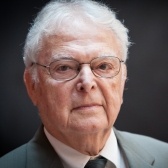June 8, 2010
Steven Fenves discusses being forced into a ghetto immediately following the German occupation of his hometown of Subotica, Yugoslavia, in March 1944. As his family was forced out of their home, they encountered a range of responses from their non-Jewish neighbors.
LISTEN
TRANSCRIPT
STEVEN FENVES:
People were lined up all along the stairway waiting to ransack the apartment, cursing us, yelling at us, spitting at us as we were leaving.
NARRATOR:
Over 60 years after the Holocaust, hatred, antisemitism, and genocide still threaten our world. The life stories of Holocaust survivors transcend the decades and remind us of the constant need to be vigilant citizens and to stop injustice, prejudice, and hatred wherever and whenever they occur.
This podcast series presents excerpts of interviews with Holocaust survivors from the United States Holocaust Memorial Museum’s public program First Person: Conversations with Holocaust Survivors. In today’s episode, Steven Fenves talks with host Bill Benson about being forced into a ghetto immediately following the German occupation of his hometown Subotica, Yugoslavia, in March of 1944. As his family was forced out of their home, they encountered a range of responses from their non-Jewish neighbors.
BILL BENSON:
Eventually of course, Hungary was on the edge of capitulating to the Allies and at that point Germany took action and stepped in and invaded your country and your community and everything changed, even far worse than you’d experienced up to that point. Tell us about when the Germans came.
STEVEN FENVES:
Well unlike the Hungarians coming in with soldiers on horseback, and all the hoopla, I don’t remember seeing the Germans come in. It was just, one day it was…the occupation was there. My father and most of the intellectuals were rounded up in the first 48 hours, taken to a makeshift camp in a small village that showed up on your map. And then they were deported to Auschwitz a couple weeks later.
We…yeah, let me back up just a couple months. School was out, I think in April, and I started working as a mechanic in a machine shop of a former employee of my fathers. Eventually we were ordered out of the… to vacate the premises and move into a row of dilapidated houses along the railroad yard.
BILL BENSON:
This was after your father was taken?
STEVEN FENVES:
A few weeks after my father was taken. So, like every other Jewish mother, my mother packed way too much stuff. Anyhow, she didn’t know what was forthcoming… so how to transport that? Well, working as a mechanic one day I helped a lady who had a little coach business, so I ran over to her and she lent us a driver with a horse and buggy and transported us there. So we were deposited, the three of us, plus my maternal grandmother, in this one room. Cramped as it was, and even more cramped with all the goodies that my mother decided to bring with her. Terrible conditions, no sanitation, no medical attention, very poor conditions.
BILL BENSON:
You told me that the day that you had to leave your home to go into the ghetto was one of the grimmest days of your life.
STEVEN FENVES:
Yep. We lived on the second floor and word was out, I don’t know how the word got out, but the word was out and people were lined up all along the stairway waiting to ransack the apartment, cursing us, yelling at us, spitting at us as we were leaving.
BILL BENSON:
These were people who had been your neighbors…
STEVEN FENVES:
People, yeah. People….yeah. Yeah, that’s very hard.
BILL BENSON:
And there was one exception to that.
STEVEN FENVES:
Yeah. The one exception was our cook, whom we had let go three years earlier. She was there, she went in the apartment, she took, my mother’s recipe book, a diary that our mother kept two and a half years after my sister’s birth and less than six months after my birth, which is normal for second children, but in addition a portfolio of as many of her drawings and etchings that she could gather. And she took that and after the war she returned them to us.
BILL BENSON:
And that’s why you have the sketches hanging on your wall today.
STEVEN FENVES:
Yep, yep.
NARRATOR:
You have been listening to First Person: Conversations with Holocaust Survivors, a podcast series of the United States Holocaust Memorial Museum. Every Wednesday at 1 p.m. from March through August, Holocaust survivors share their stories during First Person programs held at the Museum in Washington, DC. We would appreciate your feedback on this series. [Please visit the First Person podcast survey (external link) to let us know what you think.]
[On] our website you can also learn more about the Museum’s survivors, listen to the complete recordings of their conversations, and listen to the Museum podcasts Voices on Antisemitism and Voices on Genocide Prevention.


